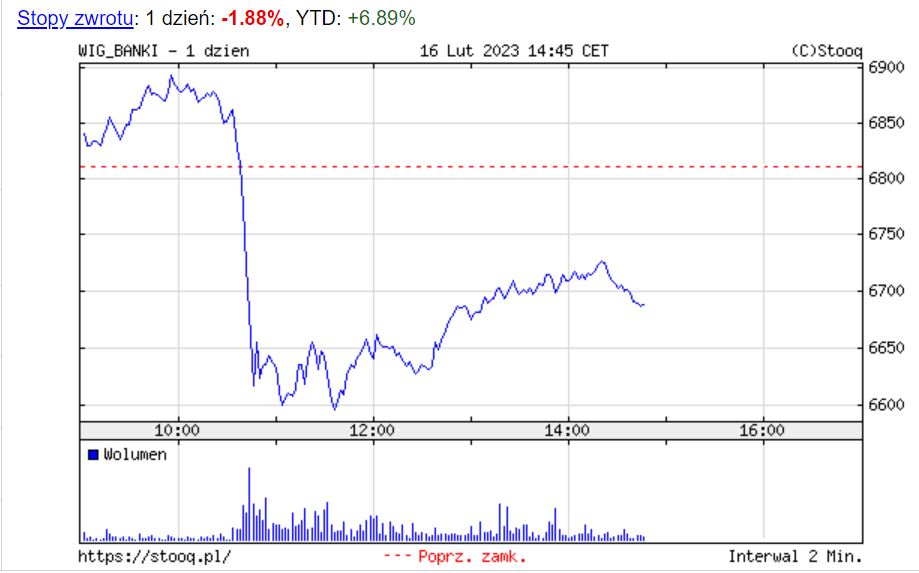
Banks may not pursue claims for the use of capital in loan contracts that were invalided by a court for unfair terms, according to an opinion issued by an advisor to the Court of Justice of the European Union (CJEU).
The case is seen as a key one for Poland’s banking sector, and Polish banks’ shares fell after the opinion was published.
#ECJ #AG Collins: after the annulment of a mortgage #loan agreement due to unfair terms, #consumers may assert claims against banks –but not vice versa- that go beyond reimbursement of monetary consideration
https://t.co/ATb3CgbPxg
— EU Court of Justice (@EUCourtPress) February 16, 2023
The case concerns thousands of mortgages in foreign currencies, mainly Swiss francs, that have been invalidated by Polish courts in recent years for containing illegal clauses.
When such a loan was annulled by the court, the customer had to return to the bank the capital they had received, and the bank would return all instalments and fees charged to the customer, plus interest.
Some banks, however, began to demand payment for the non-contractual use of the capital during the period of the invalidated contract, arguing that their customers had made a profit through, for example, appreciation of the cost of a property. Faced with these arguments, Warsaw’s district court asked the CJEU to clarify its case law.
The ECJ has said that Polish judges must decide how to deal with cases concerning almost €26 billion in foreign-currency mortgages.
Poland’s Supreme Court is expected to soon issue a landmark ruling that could have major financial consequences for banks https://t.co/91Lq6uHGyi
— Notes from Poland
(@notesfrompoland) April 30, 2021
Today one of the European court’s advocates general, Michael Collins, issued an opinion on the case. While CJEU judges do not have to follow the opinion of advocates general in their subsequent rulings, in most cases they do.
“After a mortgage contract is declared invalid due to unfair terms, consumers can pursue claims against banks beyond the reimbursement of monetary benefits; banks do not have this right,” wrote Collins.
He argued that the annulment of a mortgage loan agreement arises as a consequence of the bank having introduced an unfair term into that agreement.
“A supplier ought not to derive any economic advantage from a situation it has created by its own unlawful conduct,” read the statement issued by the CJEU today. “Such a situation might even make it profitable for banks to impose unfair terms on consumers.”
In the advocate general’s opinion, however, Polish and EU law allows for a consumer to pursue claims beyond the reimbursement of monetary performances made under an invalid mortgage loan agreement, including statutory interest for delay from the time of the demand for payment.
The Supreme Court has again delayed a key ruling concerning billions of euros of foreign-currency loans
The latest postponement related to doubts over whether, because of the government’s contested judicial reforms, some judges were legitimately appointed https://t.co/fzpXSl0vzW
— Notes from Poland
(@notesfrompoland) September 3, 2021
In response to the opinion, the Polish Bank Association (ZBP) noted that CJEU judgements do not always follow the advocate general’s position.
However, investors reacted quickly, with the banking sub-index of the Warsaw Stock Exchange losing around 2.6% after the publication. Later it recovered some losses although it was still 1.7% in the red.
The biggest losers were those banks with the largest exposure to loans in Swiss francs, namely Bank Millennium and mBank, which at 3 p.m. were down by 5.72% and 1.5% respectively, trading data from the Stooq.pl platform showed.

Bankinng subindex at Warsaw’s Stock Exchange, 16 February as of 2.45 p.m. (source: stooq.pl)
The problem of foreign-currency mortgages has animated debate in Poland for more than a decade. Hundreds of thousands of Poles took out such loans to take advantage of low-interest rates on the Swiss franc.
Later, however, many struggled to pay back instalments when the Swiss currency sharply appreciated against the Polish zloty after the 2008 financial crisis and when it was unpegged from the euro in 2015.
Currently, borrowers also have to cope with rising interest rates in Switzerland, which, although still well below the 6.5% level maintained by the Polish central bank, reached 1% for the first time since November 2008.
As of December, active foreign currency mortgages in Poland were still worth 79 billion zloty (€16.5 billion), with Swiss franc mortgages amounting to 52 billion złoty (€10.9 billion), according to the Polish Financial Supervision Authority (KNF).
Switzerland’s interest rate (source: tradingeconomics.com)
Main image credit: Mabucz/WikimediaCommons (under CC BY-SA 4.0)

Alicja Ptak is senior editor at Notes from Poland and a multimedia journalist. She previously worked for Reuters.





